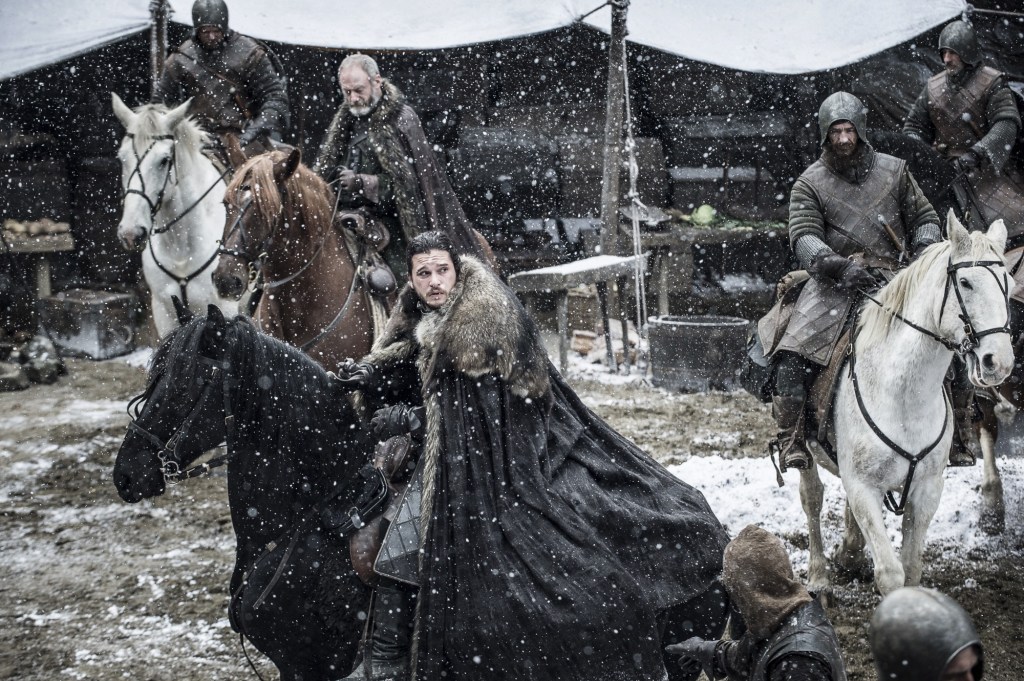Game of Thrones spoilers—they’re cold as ice, so where are the ethical boundaries?

Millions of loyal Game of Thrones viewers will tune into the season finale Sunday night. And their reaction to the conclusion—whether it’s full of excitement or dismay—will lead to immediate discussions of the events either online or at work the next day. But many others won’t watch live, with some perhaps waiting days to catch up.
This leads to an ethical dilemma: where are the boundaries for talking about the episode, both in-person and on social media, without spoiling the plot for others?
The issue isn’t entirely black and white, says ethics expert John Basl, assistant professor of philosophy at Northeastern. But, generally speaking: don’t be “that person”—the internet troll who deliberately ruins the key plot twist for others. That person should be cast north of The Wall, without winter clothes or a Valyrian steel sword.
“There’s a significant cost to spoiling,” says Basl, a huge Game of Thrones fan who named his 5-year-old Newfoundland after the character Arya Stark. “It’s a huge pop-culture show that people often can’t watch on time and they’re really invested in the drama of the show.”
However, Basl says those who have and haven’t seen it bear some responsibility to each other. “There’s an ethical burden on those who’ve seen the show not to spoil it without giving proper warning first or the opportunity for people to avoid the discussion,” he says. “And there’s also the obligation for those who haven’t seen it to make clear their preferences and to allow others to have their fun.”
Translation: Don’t come into work Monday morning wearing a T-shirt reading, “I can’t believe [insert character name here] got killed.” But on the flip side, don’t come in declaring, “I didn’t see GoT last night. Take your conversation down the street while I stride around the office with a curious ear.”
There’s a significant cost to spoiling. It’s a huge pop-culture show that people often can’t watch on time and they’re really invested in the drama of the show.
John Basl
Assistant professor of philosophy
Basl adds that there are other factors at play in this ethical quandary. On one hand, there are plenty of ways to discuss the episode immediately. You can jump into a Reddit thread where people are openly discussing the episode, or set up a text chain with friends. You don’t necessarily have to post immediately to social media, revealing key plot points. As he puts it, there are ways to talk spoilers without spoiling it for others.
On the other hand, Basl says the obligation to avoid revealing spoilers diminishes with time. “I have no sympathy for spoiling The Wire for people,” he says, referring to the HBO crime drama of the early-to-mid 2000s. “There shouldn’t be an expectation after three to five years to warn people before discussing something.”
Do the spoiler stakes rise for an episode that marks a season or series finale? Basl can’t say for sure. Instead, he says the question should be, “How much does the plot hang on the information you’re about to divulge?” Revealing which sides fought in battle is one thing. But blurting out who died in battle is quite another.
Basl is part of a Facebook group that discusses Game of Thrones after each episode. Yet he rarely watches each episode live, usually tuning in an hour or perhaps a day or two later. But the Facebook group’s posts after each episode don’t reveal anything; you have to click on it to join the discussion.
“Many of my Facebook friends are philosophers, so they’re sensitive to these ethical issues,” he says.





